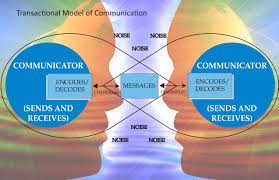PRINCIPLES OF HUMAN COMMUNICATION
Several principles are essential to an
understanding of human communication in all its forms.
Communication is
Purposeful
We communicate for a purpose; some motivation
leads us to communicate. When we speak
or write, we are trying to send some
message and trying to accomplish some goal
five general purposes seem relatively common to
all forms of communication:
to learn: to acquire knowledge of others, the world, and
ourself
to relate: to form relationships with others,
to interact with others as individuals
to help: to assist others by listening, offering
solutions
to influence: to strengthen or change the attitudes or
behaviors of others
to Entertain: to enjoy the experience of the moment
Communication is Transactional

Communication is transactional, which means that
the elements in communication
(1) Always changing,: It’s an ongoing activity; all
the elements of communication are in a state of constant change. The people
with whom we are communicating are changing, and our environment is changing.
Nothing in communication ever remains static.
(2) Interdependent (each influences the other): Each element
relates integrally to every other element. For example, there can be no source
without a receiver.
(3) Depend on the individual : Communication is influenced by a
multitude of factors such as context, our history, past experiences, attitudes,
cultural beliefs, self-image, future expectations, emotions, and our
psychological climate.
(4)Each person in the communication act is both speaker and
listener : Each person is an interaction is both sender and receiver.
Communication is a Package
of Signals
Communication involve usually, verbal and
nonverbal behaviors. Our entire body works together— verbally and non verbally—to
express our thoughts and feelings. The
socially acceptable message is usually communicated verbally while the less
socially acceptable message is communicated non verbally.
Communication is a Process
of Adjustment
Communication can take place only to the extent
that the communicators use the same system of signals.You will only be able to
communicate with another person to the extent that our language systems overlap. In reality, however, no two persons use
identical signal systems, so a process of adjustment is relevant to all forms
of communication.
Ambiguous messages are messages with more than one potential
meaning. Sometimes this ambiguity
occurs because we use words that can be interpreted differently.
Communication is Punctuated
Communication events are continuous transactions.There’s no
clear-cut beginning or ending. We divide up this continuous,
circular process into causes and effects, or stimuli and responses.
Communication is Inevitable, Irreversible, and Unrepeatable
Communication is a process that is inevitable, irreversible, and
unrepeatable. Communication messages
are always being sent, and response, and it communicates.


















0 comments:
Post a Comment